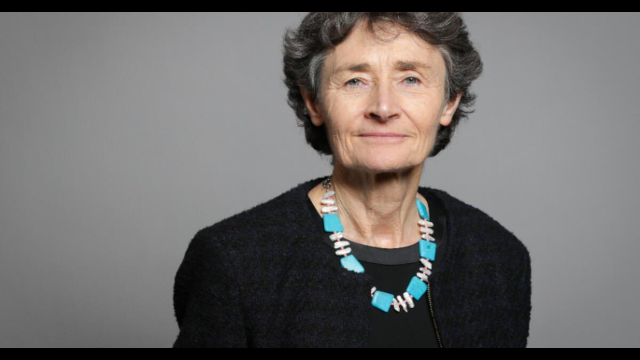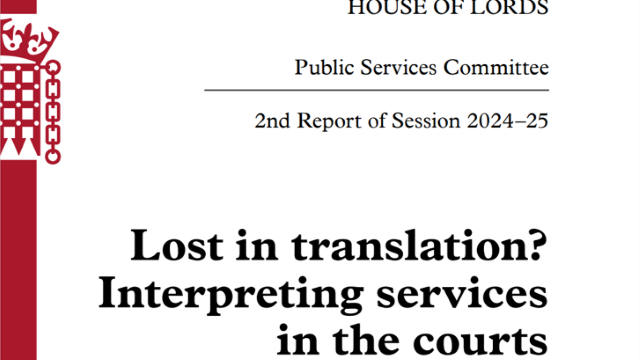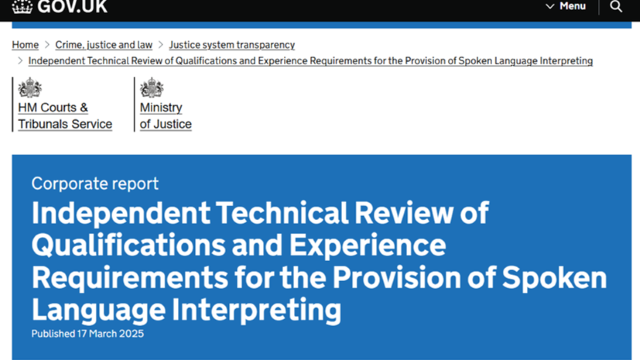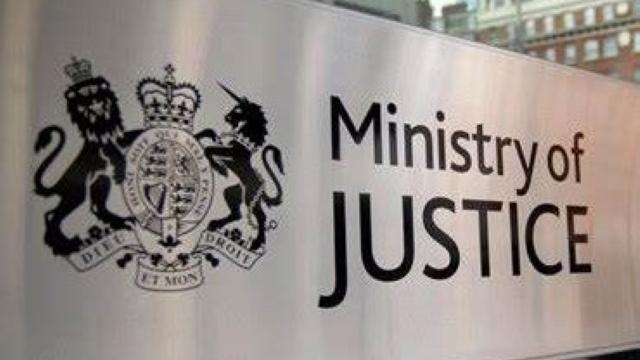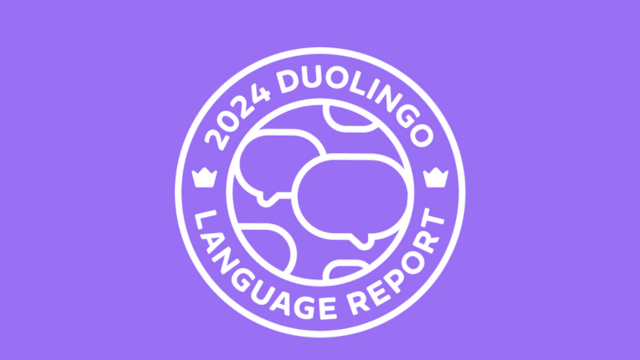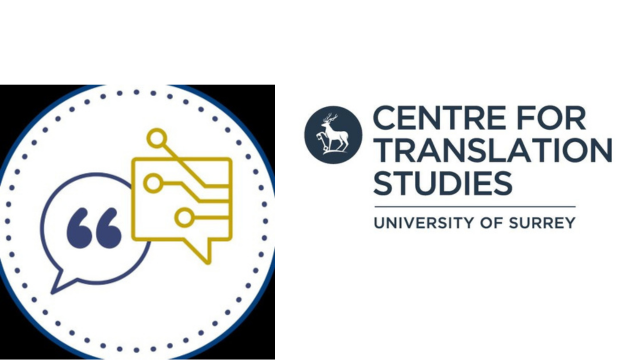-
QUALIFICATIONS
- For Linguists Worldwide
- For UK Public Services
- Preparation
- Policies & Regulation
-
MEMBERSHIP
- Join CIOL
- Membership grades
- NEW for Language Lovers
- Chartered Linguist
- Already a member?
- Professional conduct
- Business & Corporate Partners
-
ASSESSMENTS
- For Second Language Speakers
- English as a Second Language
-
EVENTS & TRAINING
- CPD, Webinars & Training
- CIOL Conference Season 2025
- Events & Networks
- CIOL Mentoring
-
NEWS & VOICES
- News & Voices
- CIOL eNews
- CIOL Awards
- The Linguist
- Jobs & Ads
-
RESOURCES
- For Translators & Interpreters
- For Universities & Students
- Standards & Norms
- CIOL & AI
- All Party Parliamentary Group
- In the UK
- UK Public Services
- Find-a-Linguist
Harmonising best practice in Certified Translations
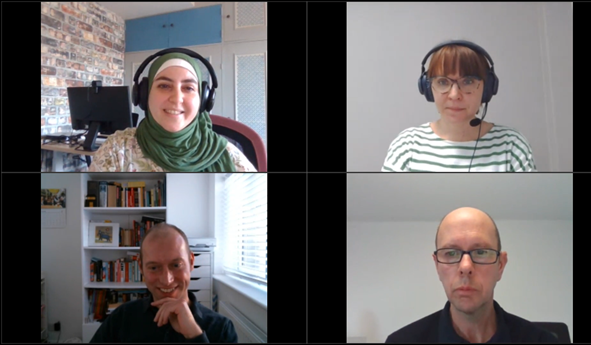
Mariam Aboelezz (CIOL Council member), Raisa McNab (CEO ATC), Dom Hebblethwaite (CIOL Head of Membership) and John Worne (CEO CIOL) were panellists in CIOL's first Roundtable discussion
Insights from CIOL's Roundtable
Introduction
The world of certified translations is a labyrinth of different practices and expectations, particularly challenging in the UK context. The recent roundtable hosted by the Chartered Institute of Linguists (CIOL) on 1 December delved deep into this complex terrain, comparing UK practices with global standards and discussing concerted efforts from CIOL and industry partners to harmonise and improve the current system in the UK.
The roundtable covered some critical questions to its participants: What are the primary challenges faced by translators in this field? How do UK practices differ from those in other countries? How can CIOL members and accredited translators encourage and promote good practices? And how can we communicate to government and public bodies the importance of engaging properly qualified translators and companies?
The Panel
The roundtable was hosted by Dom Hebblethwaite, CIOL Head of Membership, with CEO John Worne providing an overview of the work CIOL had completed in collaboration with ITI and the Association of Translation Companies (ATC), to harmonise best practices. Raisa McNab, CEO of ATC, brought a translation industry perspective to the discussion and Council member and translator Mariam Aboelezz shared her insights and tips for translators engaged in delivering certified translations.
The Audience
With over 640 attendees registered for the Certified Translations roundtable, this was one of the largest online events of the year. The attendees, based in the UK, Europe, and various locations worldwide, ranged from those experienced in certifying translations solely in the UK to those operating globally, as well as translators looking to begin certifying translations.
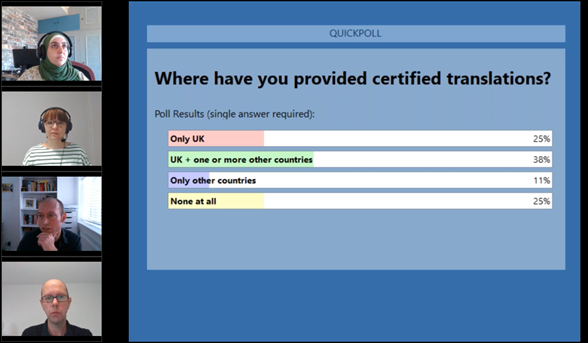
The UK's Unique Challenges
In the UK, the absence of mandatory qualifications for certified translators has been a significant issue. This gap in the regulatory framework has opened the door to self-proclaimed 'certified translators', leading to potential mistranslations and adverse impacts on businesses and individuals.
The lack of standardisation contrasts sharply with many countries where regulatory frameworks are more stringent. Examples were drawn from several European countries along with Argentina and the UAE, where often there are clear guidelines on who can offer certified translations, including specific qualifications and pricing structures.
Efforts Towards Harmonisation
Addressing these challenges, CIOL, in collaboration with the ATC and ITI, has embarked on an initiative to promote unified best practices within the UK. This collaborative effort aims to elevate the standard of certified translations by advocating the use of translators accredited by these professional bodies.
All three leading associations now recognise and endorse each other’s certification guidelines and practices. Such a move ensures that translators meet high competency and accountability standards, thus safeguarding the interests of all stakeholders.
John Worne, during his presentation, emphasised the importance of working together to solve the wide variation in practice in the UK and around the world. He highlighted the very real concerns over the lack of control or mandated use of qualified translators in the UK. He explained the diverse legal and regulatory systems worldwide, and the differences between the UK’s Common law based regulatory systems compared to Civil law systems, and the tendency of English-speaking countries towards monolingualism as factors which explain some of the differences in practice around the world.
Raisa McNab addressed the topic from an industry standpoint, elaborating on the differences in certified translation practices between a Language Services Provider (LSP) and a freelance translator. She also shared her insights on the positive impact of the harmonisation efforts by CIOL, ITI, and ATC and her hopes for ongoing improvement in the practice of certified translations in the UK.
Mariam, drawing on her extensive experience in delivering certified translations in both the UAE and the UK, explained how the process of delivering certified translations worked in the UAE and the differences she found upon moving to the UK. She also discussed some of the unique challenges she encountered in the process of certifying translations, particularly within the UK context.
The panellists also discussed strategies for translators to effectively navigate the UK's landscape for certified translations, drawing from their different experiences and diverse backgrounds. Questions on the process for certifying translations and comments on practice around the world flooded in (see additional section below), and the panel endeavoured to cover as many topics as possible in the 90 minutes available.
Conclusion
The CIOL roundtable and the joint working between ITI, ATC and CIOL marks a significant step in addressing the complexities of certified translations in the UK. While the UK's open-access approach contrasts with the more regulated systems in other countries, it is evident that there is a real need to enhance standards and protect public interests.
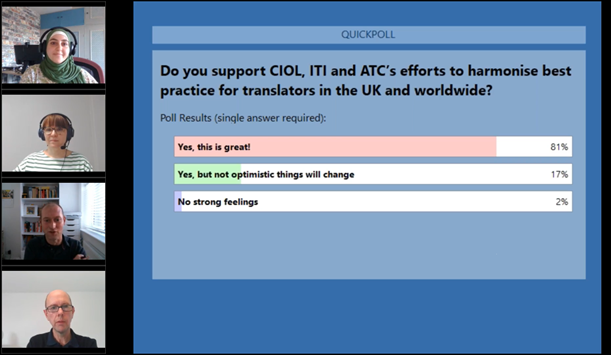
The panel, CIOL, ITI and ATC will continue to press for improvements in recognition of good practice, encourage more learning from other countries, and seek to promote our collective guidance on best practices to better ensure that certified translations in the UK are produced by suitably qualified, registered translators and reputable translation companies.
Chat comments from around the world
It’s clear that there are significant differences between the UK approach to certified translations and that of many other countries around the world. Opinions amongst the audience were divided as to the pros and cons of respective systems:
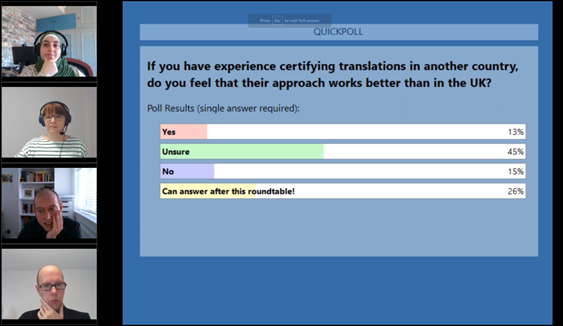
As the roundtable proceeded, many translators from around the world shared their own experiences of certifying translations in various countries. However, due to the volume of questions coming in from the audience, there was no time to share these during the event, despite this being requested by attendees in the chat. Therefore, please find below the comments related to the process of certifying translations in countries other than the UK, as supplied during the event:
EUROPE
In Italy only sworn translators can translate certified translations. You need to register to a local court to be a certified translator. Otherwise, if living in the UK, the Italian consulate will accept translations but a Notary Public will have to certify the authenticity of the translator’s signature and their membership to one of the recognised Institutes of Translators; then the Notary Public’s signature will have to be apostilled by the UK Legalization Office ((FCDO). This makes the costs of certain translations unacceptable.
In France, to become a sworn translator/interpreter you have to be qualified, experienced, and submit a lengthy application. If that’s successful, you attend a police interview, and if that is successful the police carry out a “neighbourhood inquest” where your neighbours are (randomly) asked about you. If you survive all this, you are then called in to the Appeals Court of your region and sworn in. For a 3 year-probation. Then another application to renew, and if you’ve had positive feedback from various legal entities during your probation, you will get a 5-year tenure.
I only know about France, where the status of Traducteur Juré exists, separately from the membership of a particular professional translation organisation.
Hello, thank you so much for this roundtable! Countries like Spain have a register of "sworn translators". However, the Consulate in UK requires that translations INTO English should be by ITI or CIOL qualified members.
Important post-event update: Spanish sworn translators are not 'registered' with the Spanish Ministry of Foreign Affairs (or with consulates or with anybody else. The lists available at consulates are taken from the main directory and are for informational purposes only). The process of becoming a sworn translator does not involve a simple registration. It's an appointment. And to be appointed you must pass national competitive exams (or, in the past, prove that you had completed a minimum number of credits in legal translation and interpreting at university). Together with the appointment (which is for life), we receive a licence number and an ID.
Regarding certifying 'online'. We can issue digital translations as long as we have a specific, official electronic signature (and certify translations following the other standard requirements). However, the use of digital translations is restricted, since they are theoretically only valid as 'original translations' in online procedures (many translators incorrectly advise clients to print them out, but printouts are often rejected).
I hope this clarifies things a bit. Good to see a certified translations-related conversation going on in the UK. Very much needed, I think.
In Germany we are sworn translators, but we are not authorised (qualified) to establish whether or not a document is an original or not, so I can only certify that this is a complete and correct translation of the document that was provided to me.
Translating certificates usually takes lots more time. In Germany there are official rates for translations for courts and police, for instance. The rates depend on whether text is editable or not, standard or specialised
In Sweden, it used to be the case that you had to pass an exam set by the Swedish translation association, on a regular basis ... every two years?
I am a German/British translator living in Norway. I hold a MA in technical translation and completed a masterclass in legal translation. I have basically given up on ever providing certified translation between English and German, but I recently became a state-authorised translator for Norwegian. I did not study Norwegian but took the exam instead. It was like the Finnish exam Raisa described.
REST OF WORLD
In America, members of the ATA can be certified but, again, they have to pass an exam periodically, to show they are still up to the mark.
I did work as a translator in the UAE for nine years (coming from UK, now in Italy) and the process to get recognised as a certified translation in the UAE was huge, complicated, overwhelmingly long and frustrating. All through the Ministry of Justice in Abu Dhabi.
In Algeria, certification is awarded in the form of a stamp for life by the Ministry of Justice in the languages we have studied as students at university. For example, I speak fluent Spanish but cannot become certified in Spanish because my degree languages are Arabic, French and English. The difference from other countries is we are not allowed to use a house or a virtual address: there must be a proper office where the public is received to submit and collect documents and not a virtual address or the house where the translator lives.
I am listed on the gov.uk page as a translator available in Argentina. However, in the intake form they have a question on whether I classify as a "sworn translator" in the foreign country (Argentina), to which I have to answer "no". However, my translations into English are being used in the UK, so that should be irrelevant and it makes me look less qualified.
I am a sworn translator from Argentina who has been living in the UK since 2004. As a result, I am no longer registered in Argentina. A couple of years ago, one of my clients asked me to translate their documents so that they could be used during a trip to Argentina in order to speed up the process. However, the authorities in Argentina rejected my certified translations, which had been done with my CIOL credentials, stating that it needed to be done by a local translator. This was a frustrating experience for me.
I do work also in Argentina and to provide “certified translations” in Argentina you need a local degree as a “traductor público” (public translator) and Argentinian citizenship because you are working in a semi-public service. So it is not that “great” system if you are a foreign translator living in Argentina. You can’t work basically.
In Brazil, a public translator is awarded the title "Professional Translator and Public Interpreter" and the person concerned would have a licence and would be registered with the commercial trade board of the state of their residency in the country. The Brazilian legislation requires that sworn translators pass a public examination almost like a civil servant would do before taking a role in the civil service. All documents presented to Brazilian authorities must be translated by a sworn translator registered in Brazil. Translators will have their own seal and stamp which will bear the Brazilian Government coat of arms. Another thing widely used in Brazil is the digital signature. All documents digitally signed are authenticated by the government and this can be checked by users by logging on to the government website.
Filter by category
More
The Chartered Institute of Linguists (CIOL), Incorporated by Royal Charter, Registered in England and Wales Number RC 000808 and the IoL Educational Trust (IoLET), trading as CIOL Qualifications, Company limited by Guarantee, Registered in England and Wales Number 04297497 and Registered Charity Number 1090263. CIOL is a not-for-profit organisation.

